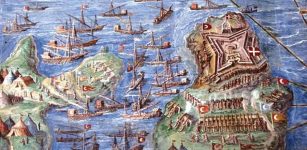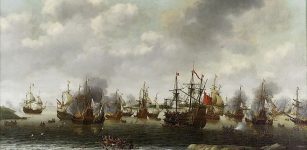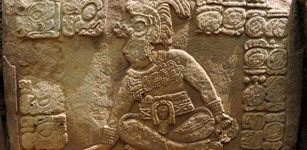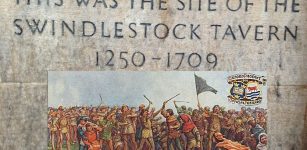On This Day In History: Henry Every’s Largest Robbery In History Of Piracy Took Place – On Sep 7, 1695
MessageToEagle.com – On Sep 7, 1695, the English pirate Henry Every, (nicknamed “King of the Pirates” or “The Arch Pirate”) stole loot worth up to $400 million (in today’s currency).
It was one of the largest pirate captures in recorded history.
Every operated in the Atlantic and Indian oceans in the mid-1690s and was the most notorious pirate of his time.
He sailed with his vessel Fancy south en route to the Indian Ocean, plundering five ships off the West African coast; then he reached the Comoros Islands in 1695, where Every’s crew raided a French vessel and narrowly escaped capture by three East Indiamen.
Subsequently, Every continued north to the Arabian Sea, where a 25-ship convoy of Grand Mughal vessels was making the annual pilgrimage to Mecca, including the treasure-laden flagship Ganj-i-sawai (“(“Excess goods”), and its escort, the Fateh Muhammed.
See also:
Why Did Pirates And Sailors Wear Earrings?
When And What Was The Golden Age Of Piracy?
The fleet belonged to the ruler of the Indian Empire, the Great Mogul Aurangzeb. The mighty Aurangzeb was an Orthodox Muslim, unlike his father Shah Jahan, who built the famous Taj Mahal, and was much more “liberal” regarding his faith.
 Aurangzeb expanded his empire, which also included India, and made huge profits. His fleet was returning from Mecca to India, when they were attacked by Henry Every and the pirates.
Aurangzeb expanded his empire, which also included India, and made huge profits. His fleet was returning from Mecca to India, when they were attacked by Henry Every and the pirates.
The battle, which was not easy, took place in the Arabian Sea and lasted for two or three hours.
Every decided for a salvo attack, using his broadside guns, and hit the main mast of the Indian ship.
Many pirates were killed, but Every had captured up to £600,000 in precious metals and jewels, making him the richest pirate in the world, equivalent to around £52.4m in 2010.
Finally, the Indians surrendered themselves. After this raid, Every and his crew tortured and killed a great number of the passengers and raped women.
Every and his crew fled to the Bahamas, adopted aliases, then many decided to sail home to the British Isles or to other places.
Twenty-four of the pirates were eventually captured, and six were tried, convicted, and hanged in London in November 1696. Every eluded capture, vanishing from all records in 1696; his whereabouts and activities after this period are unknown.
MessageToEagle.com
Expand for referencesReferences:











